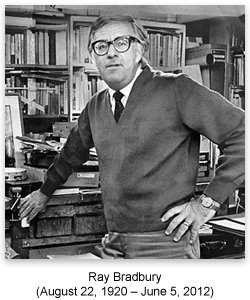

On June 5, acclaimed author Ray Bradbury passed away. I can't say I have been much affected by the loss. My relationships with most authors typically begin and end within the pages of their books. I find that delving into writers' and actors' lives — specifically the components of their political beliefs — is often a disappointing venture to complete. Yet it still saddens me that our world is no longer graced by the man's presence.
It is interesting that he descended from Mary Bradbury, a woman who was convicted and sentenced to hang in the 1600s during the infamous Salem witch trials. After such brutalities were imposed on the family, I can't tell if it's nature or nurture that Ray grew up to be skeptical of the way things were. Among Mary's other descendents is Ralph Waldo Emerson, the world-renowned individualist writer who grew up to say, “The less government we have the better.” I found out a few years ago that one of my great-great-great-great- ad infinitum grandmothers, too, was prosecuted as a witch during the Puritans' wicked trials. I can take this only as a fantastic compliment and hope that my antistate relatives were fighting the good fight with the Bradbury family, leading to the libertarian ideals I now cherish so deeply.
Bradbury's first original book, Fahrenheit 451, is a fiery testament against the censorship of opposing ideas. He maintained repeatedly that the people — not the state — were the book's antagonists, but the real enemy, more than the actual individuals in question, was their obsession with political correctness, which led to the shredding and burning of old literature in the first place. And as anyone will tell you, we libertarians typically have little patience for political correctness. It does nothing except dilute the true meaning of words and stupefies the population into apathy.
[continue reading…]
Help Promote Prometheus Unbound by Sharing this Post

 There is a certain charm to the recently released John Carter, helmed by Andrew Stanton. The two leads, Taylor Kitsch's John Carter and Lynn Collins's Dejah Thoris, have enough chemistry to draw the audience in; the world of Mars itself is a treat for the eyes; the basic plot is well within the bounds of standard epic adventure but perfectly sound; and many of the situations that the characters find themselves in have real potential, albeit never fully realized. In short, there was a grand story there for the telling, had there been a director capable enough to pull it off. There was not, and consequently a theatergoer is likely to leave feeling frustrated by the large gap between what was and what might have been.
There is a certain charm to the recently released John Carter, helmed by Andrew Stanton. The two leads, Taylor Kitsch's John Carter and Lynn Collins's Dejah Thoris, have enough chemistry to draw the audience in; the world of Mars itself is a treat for the eyes; the basic plot is well within the bounds of standard epic adventure but perfectly sound; and many of the situations that the characters find themselves in have real potential, albeit never fully realized. In short, there was a grand story there for the telling, had there been a director capable enough to pull it off. There was not, and consequently a theatergoer is likely to leave feeling frustrated by the large gap between what was and what might have been.
After a useless prologue that actually ruins the later effect when the protagonist appears on Mars for the first time, we are introduced to John Carter, a former officer of the Confederacy and current gold prospector. When the United States army tries to conscript him to fight the Apaches in Arizona, he tells them he owes them nothing and prefers to go about his own business. This defiance of the state should not excite the libertarian too much, however, because just moments before, he was busy abusing the rights of a shop owner, refusing to leave the man's store when he wouldn't sell. Carter's reticence to join and fight, it turns out, is more about his bleak personal cynicism after the deaths of his wife and child than it is about a freedom-friendly moral code.
In the course of his attempt to escape the clutches of the war machine, he stumbles upon a cave where he is ambushed by a strangely dressed man with seemingly magical powers (the reason for the ambush is never made clear, though one cannot help but notice that the plot would have come to a standstill without it). After killing the ambusher, Carter takes a medallion from his cadaver and gets transported to a strange land he eventually learns is the planet Mars. He discovers he has extraordinary new powers with which he amazes some of the creatures he finds there.
Eventually, he meets a woman, a princess, fleeing an arranged marriage that could stop a war between two city-states. She wants to use him and his incredible physical prowess for her ends, which are to save her city-state from destruction without getting married; he wants to use her for his, which are to return to Earth with the help of her esoteric knowledge of his amulet. They form a distrustful alliance and adventure ensues. I'll leave it to the reader to guess whether or not they fall in love.
[continue reading…]
Help Promote Prometheus Unbound by Sharing this Post




